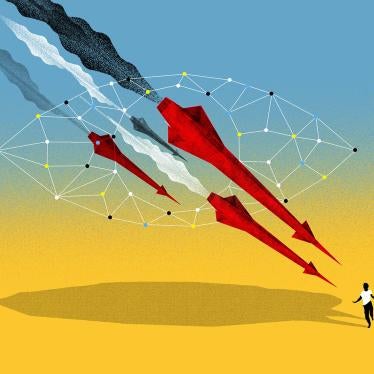(Brussels) – The president of the European Union Council, Herman van Rompuy, and EU member states should express their concern over the prosecution and the potential suspension of Judge Baltasar Garzón of Spain for investigating Franco-era abuses, Human Rights Watch said today.
Garzón, of Spain’s National Audience tribunal, faces trial and suspension from his duties for investigating alleged cases of illegal detention and forced disappearances committed in Spain between 1936 and 1952. A Supreme Court investigating magistrate, Luciano Varela, has ruled that by intentionally bypassing Spain's 1977 amnesty law for "political acts," Garzón committed an abuse of power.
"Garzón sought justice for victims of human rights abuses abroad and now he's being punished for trying to do the same at home," said Lotte Leicht, EU advocacy director at Human Rights Watch. "The decision leaves Spain and Europe open to the charge of double standards and undermines the EU's credibility and effectiveness in the fight against impunity for serious crimes."
Varela’s decisions are expected to lead to a criminal prosecution of Garzón, and as a result, Spain’s General Council of the Judiciary (Consejo General del Poder Judicial) will consider Garzón’s temporary suspension.
However, Garzón’s decision not to apply Spain’s amnesty is supported by international conventional and customary law, which impose on states a duty to investigate the worst international crimes, including crimes against humanity. The sanctions against Garzón are not only a blow to the families of victims of serious crimes in Spain, Human Rights Watch said. The sanctions also risk undermining the EU’s collective credibility and effectiveness in seeking justice for current human rights crimes, be they in Darfur, the Democratic Republic of Congo, or Sri Lanka.
Under international law, governments have an obligation to ensure that victims of human rights abuses have equal and effective access to justice, as well as an effective remedy – including justice, truth, and adequate reparations – after they suffer a violation. The International Covenant on Civil and Political Rights (ICCPR), which Spain ratified in 1977 – before adopting the amnesty law - specifically states that governments have an obligation “to ensure that any person whose rights or freedoms … are violated shall have an effective remedy.”
In 2008, the UN Human Rights Committee, in charge of monitoring compliance with the ICCPR, called on Spain to repeal the 1977 amnesty law and to ensure that domestic courts do not apply limitation periods to crimes against humanity. In 2009, the Committee against Torture also recommended that Spain “ensure that acts of torture, which also include enforced disappearances, are not offences subject to amnesty” and asked Spain to “continue to step up its efforts to help the families of victims to find out what happened to the missing persons, to identify them, and to have their remains exhumed, if possible.”
The European Court of Human Rights held in 2009 (Ould Dah v France No. 13113/03, Decision on admissibility) as a general principle, that an amnesty law is generally incompatible with states’ duty to investigate acts of torture or barbarity.






